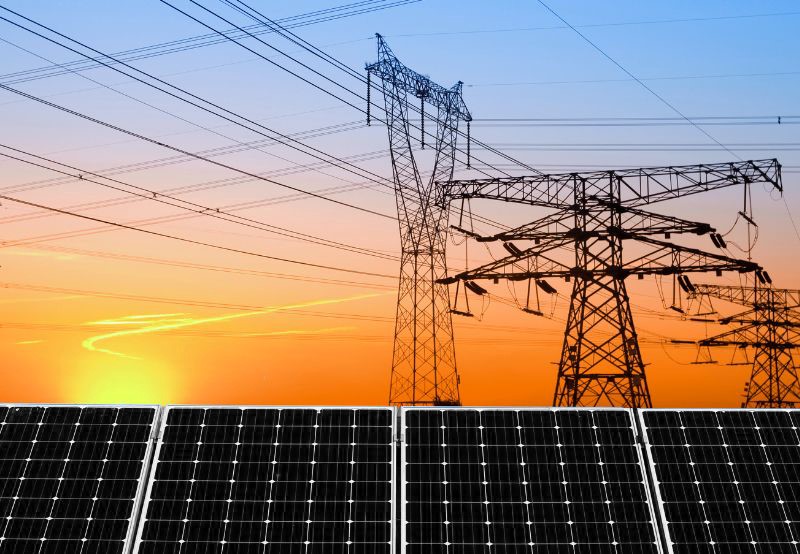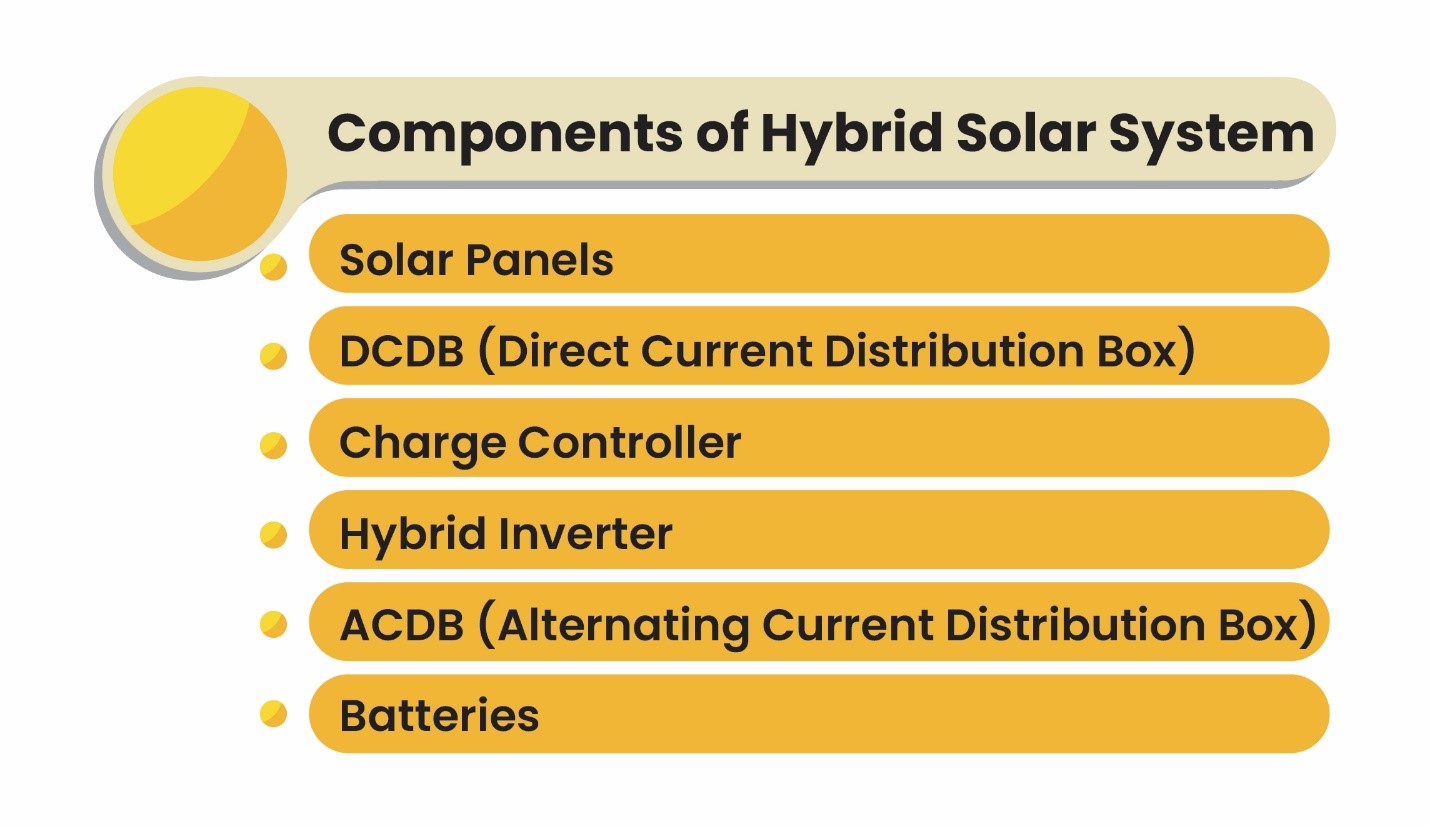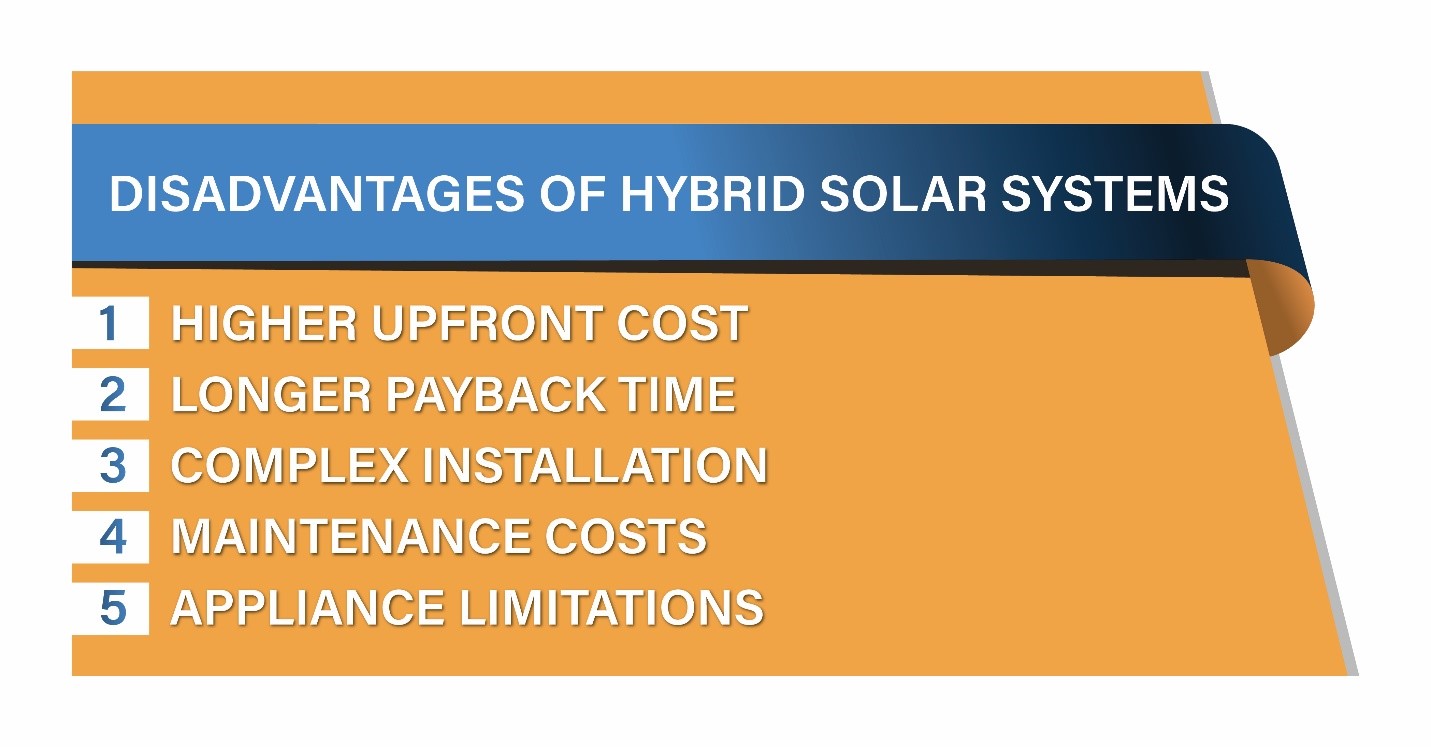When installing solar systems for homes, people often have to choose between an on-grid solar system and an off-grid solar system. However, now options like “Hybrid Solar System ” are available in the solar market. This system is a combination of on-grid and off-grid solar PV modules. It also includes a battery bank to store excess electricity, and often the hybrid solar panels are connected to the electric grid for net metering purposes. Hybrid solar panels are efficient, reliable, and a great investment for homeowners.

In simple terms, a hybrid solar system is a renewable energy system that is grid-tied and includes battery storage. Solar panels are used to produce electricity during the day. Meanwhile, the batteries store excess energy for later use at night when there is no sunlight.
Its 100% FREE
You can have a quick idea about the cost of switching to solar
Our Energy professionals are one call away for advice
A hybrid solar system includes solar panels, a hybrid inverter, and a battery bank. As the name suggests, hybrid panels have both on-grid and off-grid capabilities, allowing you to maintain a continuous supply of electricity.
In simple terms, in a hybrid solar system, the solar panels remain connected to the grid and have a battery backup system to store excess power for later use.
Does Hybrid Solar System Right for My Home?
Installing hybrid solar panels in your homes or businesses can be expensive. However, solar energy is beneficial regardless of its upfront cost.
If you want to reduce your carbon footprint, power your house through solar energy, slash your electricity bill using solar power, reduce your reliance on grid electricity, or want to sell surplus electricity to utility stations. Then, you should consider installing hybrid solar panels.
On cloudy days or at night, your panels will not have direct sunlight to convert into electricity. However, with the help of hybrid solar panels, you can still power your home and business by connecting to the grid. However, if your solar panel system generates surplus electricity, it can be sent back to the grid stations, which can help you earn bill credits.
The working mechanism of off-grid solar systems and hybrid solar panels is similar. They both convert solar energy into DC power through “Photovoltaic cells.” DC power can either be stored in batteries for later use or transferred to a solar inverter. The primary function of the solar inverter is to convert DC power into AC power.
You can deal with surplus electricity produced by your hybrid solar panels in two ways: either you can store it or send the excess electricity back to the grid station.
Hybrid solar panels and off-grid systems offer different benefits. It boils down to individual needs and preferences when it comes to installing hybrid or off-grid solar panels.
With hybrid solar panels, you have the advantage of a backup electrical grid connection. This means that during times when your solar panels cannot generate sufficient power, such as on cloudy days or during periods of high energy demand, you can still rely on the grid for electricity. This provides flexibility and ensures a consistent power supply. Additionally, if your hybrid system generates excess energy, you can send it back to the grid and potentially receive credits or compensation.
On the other hand, an off-grid system offers complete energy independence as it operates solely on solar power. This eliminates the risk of fluctuating utility costs and provides resilience during power outages. Off-grid solar systems are eco-friendly and can also reduce your carbon footprint by relying solely on renewable energy. However, it’s important to note that off-grid systems are not completely reliable. During extended periods of low sunlight or when your system needs maintenance, there is no backup power source available for your off-grid solar system.
Ultimately, the decision between hybrid solar panels and an off-grid system depends on various factors. These factors are the reliability of the local grid, the availability of sunlight in your area, your energy consumption patterns, and your desire for energy independence. Assessing your household energy needs and consulting with solar energy professionals can help you determine the suitable option for your requirement.
With a hybrid PV system, you will be able to utilize less grid electricity while still having access to grid station. Highly efficient panels will maximize your energy production. The key feature that sets hybrid solar panels apart is their ability to maintain a continuous supply of electricity during inclement weather conditions or power outages.
Hybrid solar power systems also allow you to sell extra energy to grid companies in exchange for bill credits, which can lower your electricity bill. If you want to go completely off-grid, you cannot sell your surplus electricity to utility companies.
Overall, a hybrid solar panel system offers more stability and reliability compared to off-grid solar arrays.
A hybrid solar system consists of several essential components that work together to generate and store electricity from the sun. These components include:
These panels are typically mounted on rooftops or in open spaces that receive direct sunlight. They convert sunlight into direct current (DC).
The DCDB is a combiner box equipped with fuses, miniature circuit breakers (MCBs), and surge protection devices (SPDs). Its primary function is to combine multiple strings of solar panels into one string, which has a positive and a negative output.
The charge controller regulates the charging process of the battery. It ensures that the battery is not overcharged by controlling the current flowing into it, thereby extending the battery’s lifespan.
The hybrid inverter plays a crucial role in the system. It converts the direct current (DC) stored in the battery into alternating current (AC). Additionally, it manages the connection to the main electrical grid, allowing for energy exchange between the solar system and the grid.
The ACDB is a safety device that incorporates fuses, MCBs, and SPDs to protect appliances from malfunctions in the hybrid inverter. It ensures the safe distribution of AC electricity to various household loads.
Batteries can store the DC electricity generated by the solar panels. They come in different types, such as lithium polymer (Li-Po), lithium-ion, or lead-acid batteries. These batteries store excess energy during the day for use during periods of low sunlight or at night.


Hybrid solar systems are generally more expensive as compared to conventional on-grid and off-grid solar systems. However, they offer significant benefits such as lower electricity bills and a continuous power supply. The cost may vary based on factors such as the quality of components, manufacturers, availability, and other variables. There is no fixed price for hybrid solar systems, as prices can differ among sellers, models, and installers. It’s advisable to consult with different suppliers and installers to get accurate pricing information according to your specific energy requirements.
The major factor that impacts the cost of solar hybrid systems is the type of inverter you install. There are three types of inverters:
These inverters are the least expensive. However, one drawback of using string inverters is the difficulty in accessing the individual performance of each panel.
They are the most expensive inverters because you have to attach a micro inverter to every single hybrid solar panel.
Hybrid inverters are less expensive than micro inverters but they work similarly. They use a centralized inverter with power optimizers in each of the solar panels. The optimizers tune their output to match the inverter which is made possible through DC-to-DC converter technology.
There are three main types of hybrid solar inverters:
The basic hybrid solar inverter is the most common type of solar inverter. It allows you to store solar energy in a battery, providing a backup power source during outages. However, it lacks reliability during power cuts because it is not connected to a grid system.
This solar inverter has a built-in backup system or a separate unit. You can charge your solar batteries using this inverter which can later be utilized during a power cut.
This solar inverter has a built-in backup system or a separate unit. You can charge your solar batteries using this inverter which can later be utilized during a power cut.
Hybrid solar systems allow you to store excess solar energy, which can be used later when solar panel power production is low or during peak evening times when electricity tariffs are high. This can help you save a lot on your utility electricity bill.
In emergency situations or power outages, hybrid solar systems provide a reliable backup power source. This ensures continuous electricity supply for appliances and critical loads, enhancing the overall reliability of the system.
By incorporating energy storage capabilities, hybrid solar systems reduce your reliance on the utility grid. This means you can consume solar-generated electricity even during non-sunny days or at night, decreasing your dependence on grid-supplied power.
Utilizing stored solar energy during peak evening times, when electricity prices are high, can lead to significant savings on your electricity bill. Additionally, by reducing dependence on the grid and its associated costs, hybrid solar systems can help lower overall power consumption.
Hybrid solar systems contribute to reducing your carbon footprint. By generating and utilizing clean energy from the sun, these systems help decrease reliance on fossil fuels, thereby mitigating greenhouse gas emissions and promoting environmental sustainability.

Hybrid solar systems tend to have a higher initial cost compared to traditional solar installations, primarily due to the expense of incorporating energy storage in the form of batteries. The cost of the additional equipment and installation can increase the upfront investment.
Due to the higher upfront cost, the payback period for hybrid solar systems can be longer as compared to solar PV modules. It may take more time to recoup the initial investment through energy savings.
Hybrid solar systems require more space and often have more complex installation requirements than standard solar systems. The need to accommodate energy storage equipment, such as batteries, can result in higher installation costs and necessitate careful planning to ensure adequate space is available.
Hybrid solar systems typically involve the use of batteries, which have a limited lifespan of around 4 to 6 years. As a result, regular battery replacements are necessary, leading to additional maintenance costs over time.
Depending on the type of hybrid inverter and its capabilities, the backup power provided by the system may be limited, potentially restricting the number of appliances that can be powered simultaneously during a power outage. However, the primary purpose of backup power is to support critical loads, so this limitation may not be a significant drawback for most users.

Yes, you can install the hybrid panels yourself, however, it is quite a difficult process. You have to go the extra mile to research and purchase the appropriate parts for installation. However, it is not advisable to do a DIY installation for hybrid solar systems. It is better to rely on professionals for the installation of solar hybrid systems. Professional installers ensure that your system is properly sized and handle permits and inspections, ensuring a safe and efficient installation.
In conclusion, hybrid solar systems offer various benefits including energy storage, power backup, reduced grid dependence, savings on electricity bills, and environmental benefits. Ultimately, the decision to opt for a hybrid solar system should be based on individual needs. With careful evaluation and expert guidance, hybrid solar systems can provide a reliable and sustainable source of energy, contributing to a sustainable future.
Are you ready to invest in solar energy that can save you money? Then, call us now at +1(832) 626 2337. Solar SME expert team will help you find out the best solar system that will meet your energy requirement.
This website stores data such as cookies to enable essential site functionality, as well as marketing, personalization , and analytics. by remaining on this website, you indicate your consent. Privacy Policy